If you’re about to move, there’s a fairly good chance a new job opportunity inspires your relocation. Whether it’s for a major bump in pay or long-term career prospects, roughly 45 percent of people move when work is the primary consideration. Even with major industry titans like Facebook and Uber calling for people to relocate to bustling cities like San Francisco, New York, and Los Angeles, we found 1 in 4 people who move for work ultimately regret the decision. The allure of a better-paying job or a new city may be tempting, but relocating your life (or family) is about so much more than your ZIP code or the state you call home. For a closer look at what it’s like to leave the neighborhood you grew up in, we surveyed around 1,000 people about the effects of moving. Read on as we show how long the average millennial stays in the same place, what living arrangements people are most willing to compromise on, and their biggest regrets after settling down.
Creature comforts
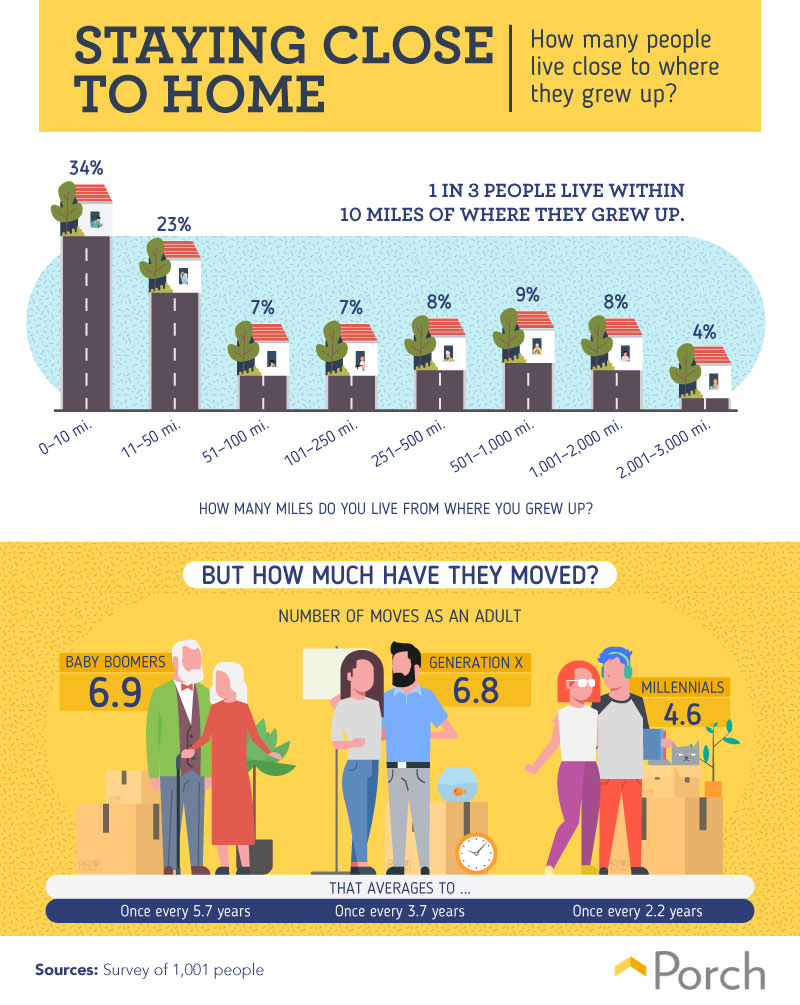 Research indicates that where you live can have a profound impact on your health, happiness, and financial status. Real estate agents are famous for citing “location, location, location” as the foremost priority when looking for a new home, and they might be right. Not only are some states linked to healthier residents, but also how far you commute to work can impact your physical and emotional well-being. For many people, living closer to their family can also lead to more happiness or fulfillment. Experts suggest the proximity can be beneficial to both parents and children, particularly as they age. Thirty-four percent of people surveyed lived within 10 miles of where they grew up, and another 23 percent only moved between 11 and 50 miles away. While around 1 in 5 respondents took a more dramatic plunge—moving 501 miles away or more—a majority of people stayed close to their roots, even later in life. While much attention has been paid to millennials wanting to move to big cities (and then back to the suburbs eventually), our survey shows younger Americans moved with much more frequency than either Gen Xers or baby boomers. Where millennials reported moving once every two years on average, Gen Xers lived in the same place for nearly four years before moving, and baby boomers stayed put for close to six years.
Research indicates that where you live can have a profound impact on your health, happiness, and financial status. Real estate agents are famous for citing “location, location, location” as the foremost priority when looking for a new home, and they might be right. Not only are some states linked to healthier residents, but also how far you commute to work can impact your physical and emotional well-being. For many people, living closer to their family can also lead to more happiness or fulfillment. Experts suggest the proximity can be beneficial to both parents and children, particularly as they age. Thirty-four percent of people surveyed lived within 10 miles of where they grew up, and another 23 percent only moved between 11 and 50 miles away. While around 1 in 5 respondents took a more dramatic plunge—moving 501 miles away or more—a majority of people stayed close to their roots, even later in life. While much attention has been paid to millennials wanting to move to big cities (and then back to the suburbs eventually), our survey shows younger Americans moved with much more frequency than either Gen Xers or baby boomers. Where millennials reported moving once every two years on average, Gen Xers lived in the same place for nearly four years before moving, and baby boomers stayed put for close to six years.
The art of compromise
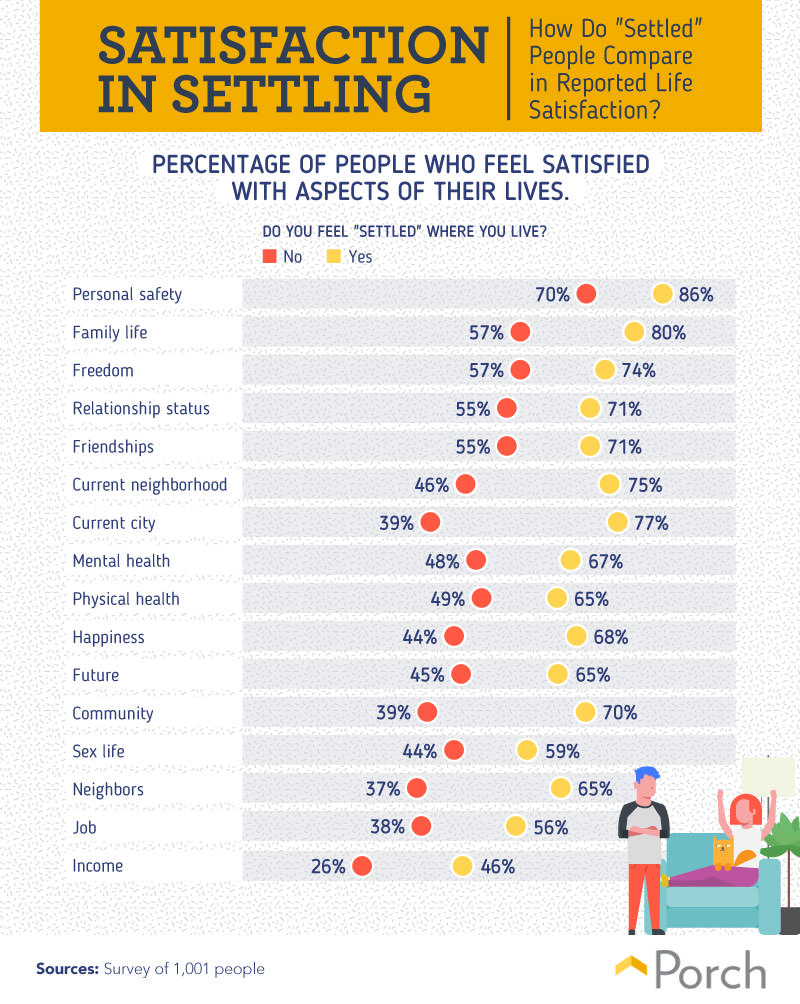 Whether you’re renting an apartment or buying your first home, moving requires you to separate the things you need from the things you want and prioritizing both lists accordingly. Regardless of your expectations, it’s fair to suggest there’s no such thing as a perfect move (unless you happen to have very deep pockets). Most people have to recognize how much they can afford in a new home or apartment and build their needs and wants around that budget. Respondents who felt “settled” with where they lived were largely satisfied with three major areas of their lives: personal safety (86 percent), family life (80 percent), and their current city (77 percent). In contrast, people who weren’t completely “settled” were often less satisfied overall. Just 70 percent were happy with their personal safety, and less than half were happy with other life factors ranging from their community (39 percent) to their job (38 percent) and mental health (48 percent).
Whether you’re renting an apartment or buying your first home, moving requires you to separate the things you need from the things you want and prioritizing both lists accordingly. Regardless of your expectations, it’s fair to suggest there’s no such thing as a perfect move (unless you happen to have very deep pockets). Most people have to recognize how much they can afford in a new home or apartment and build their needs and wants around that budget. Respondents who felt “settled” with where they lived were largely satisfied with three major areas of their lives: personal safety (86 percent), family life (80 percent), and their current city (77 percent). In contrast, people who weren’t completely “settled” were often less satisfied overall. Just 70 percent were happy with their personal safety, and less than half were happy with other life factors ranging from their community (39 percent) to their job (38 percent) and mental health (48 percent).
Losing touch
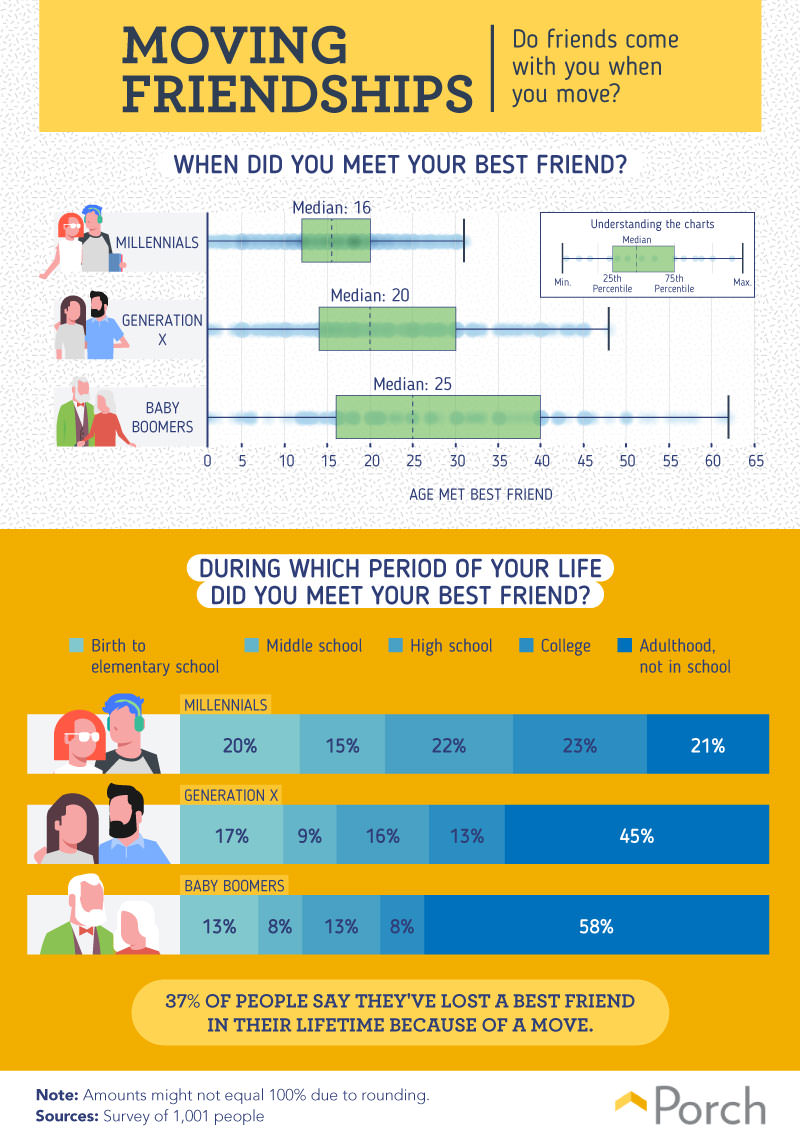 Sure, packing your possessions and moving across town (or state lines) probably means you’ll have to find a new favorite pizza joint or hairstylist, but it can also mean having to make new friends. Not only is it challenging for some people to build new relationships as an adult after moving, but also there’s a possibility you could lose touch with your close friends during the process. More than 1 in 3 people admitted to losing a best friend as a result of moving—perhaps even harder for millennials who often met their best friends in high school or college. While there’s an argument to be made for “decluttering” your friend list so you can enjoy the future, it can be detrimental to your mental health.
Sure, packing your possessions and moving across town (or state lines) probably means you’ll have to find a new favorite pizza joint or hairstylist, but it can also mean having to make new friends. Not only is it challenging for some people to build new relationships as an adult after moving, but also there’s a possibility you could lose touch with your close friends during the process. More than 1 in 3 people admitted to losing a best friend as a result of moving—perhaps even harder for millennials who often met their best friends in high school or college. While there’s an argument to be made for “decluttering” your friend list so you can enjoy the future, it can be detrimental to your mental health.
Securing the bag
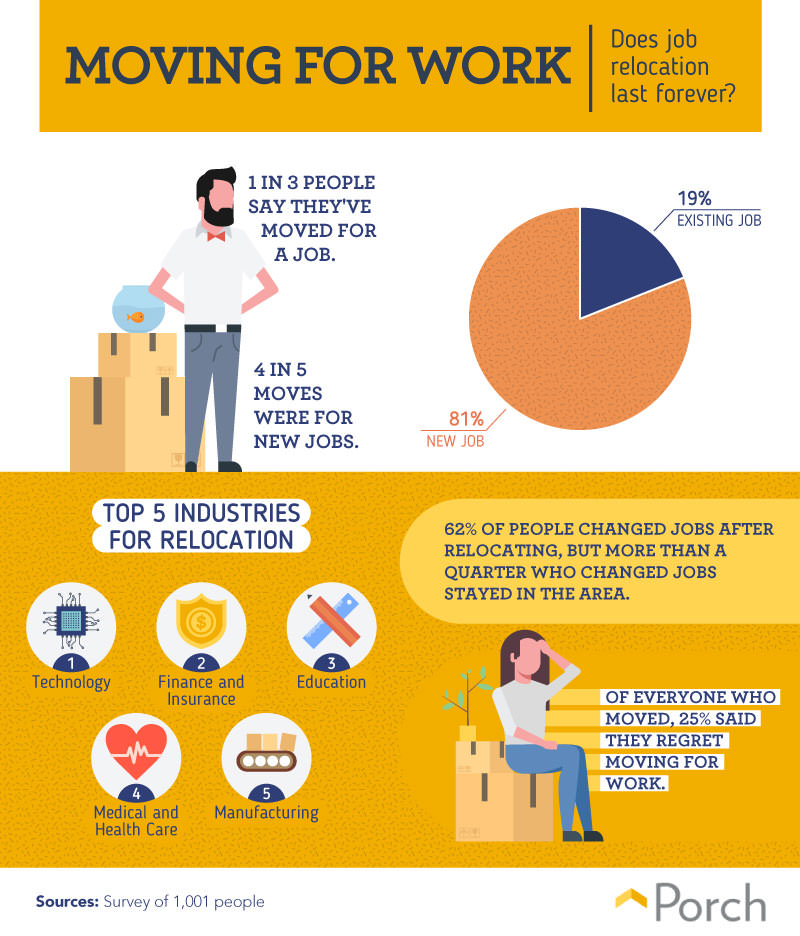 In the first half of 2018, more than 10 percent of people looking for a job relocated as a result of their new employment. At the end of 2017, the rate was at an eight-year high at 16.5 percent of job seekers. Of course, for many people, deciding whether to move for a prestigious position or salary increase is more complicated than just dollars and cents. Not only do you have to think about the longevity of the position you’re taking, but also it’s important to consider your family and personal development. More than 1 in 3 people moved at some point for a new job, and for 81 percent of those people, it was a new job that inspired them to relocate. Tech jobs were the biggest influence in luring people toward a new opportunity, followed by finance and insurance and education. Despite what you might think about Silicon Valley, in 2018, some of the biggest cities for technology included Charlotte, North Carolina, Austin, Texas, and Denver, Colorado. Unfortunately, 25 percent of people who moved for work ultimately regretted the decision.
In the first half of 2018, more than 10 percent of people looking for a job relocated as a result of their new employment. At the end of 2017, the rate was at an eight-year high at 16.5 percent of job seekers. Of course, for many people, deciding whether to move for a prestigious position or salary increase is more complicated than just dollars and cents. Not only do you have to think about the longevity of the position you’re taking, but also it’s important to consider your family and personal development. More than 1 in 3 people moved at some point for a new job, and for 81 percent of those people, it was a new job that inspired them to relocate. Tech jobs were the biggest influence in luring people toward a new opportunity, followed by finance and insurance and education. Despite what you might think about Silicon Valley, in 2018, some of the biggest cities for technology included Charlotte, North Carolina, Austin, Texas, and Denver, Colorado. Unfortunately, 25 percent of people who moved for work ultimately regretted the decision.
Moving on
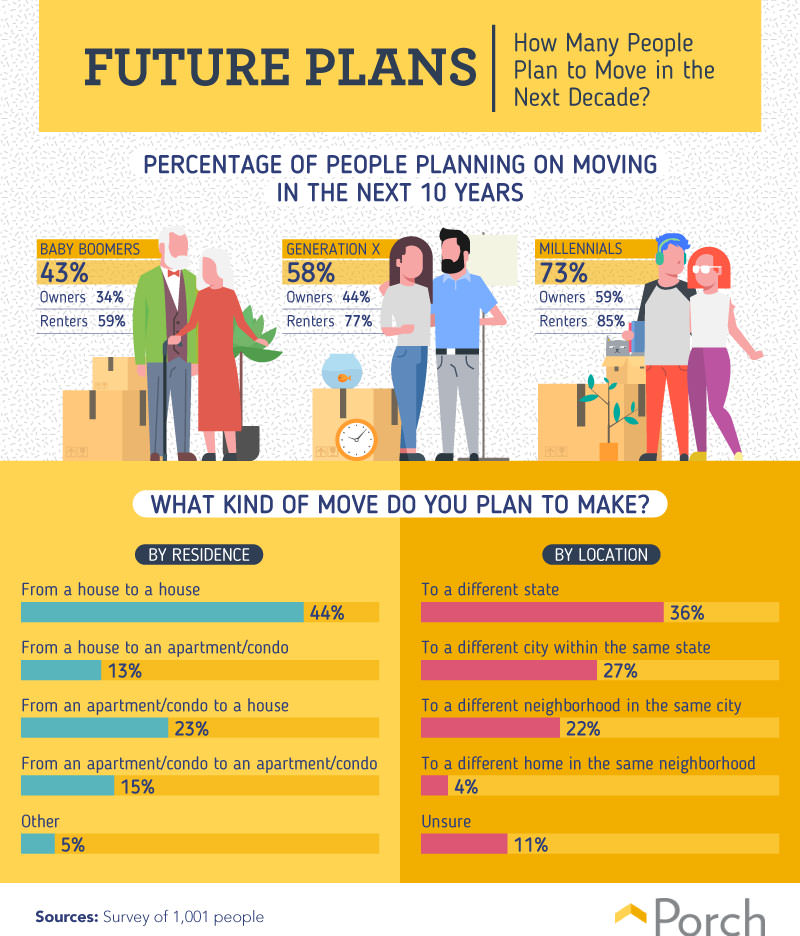 Millennials aren’t buying their homes as early as their parents or grandparents did at the same age, and as our survey found, they also aren’t living in the same location as long as older generations. Student loan debt was the biggest reason millennials put off homeownership and could be a variable contributing to their willingness to move. Compared to 43 percent of baby boomers and 58 percent of Gen Xers, 73 percent of millennials expressed a plan to move within the next 10 years. Those millennials were comprised of 85 percent of renters and 59 percent of homeowners. While moving from one house to another (44 percent) or from an apartment to a house (23 percent) was often the most common transition, 36 percent of people made plans to move out of state, and another 27 percent planned to move to a different city.
Millennials aren’t buying their homes as early as their parents or grandparents did at the same age, and as our survey found, they also aren’t living in the same location as long as older generations. Student loan debt was the biggest reason millennials put off homeownership and could be a variable contributing to their willingness to move. Compared to 43 percent of baby boomers and 58 percent of Gen Xers, 73 percent of millennials expressed a plan to move within the next 10 years. Those millennials were comprised of 85 percent of renters and 59 percent of homeowners. While moving from one house to another (44 percent) or from an apartment to a house (23 percent) was often the most common transition, 36 percent of people made plans to move out of state, and another 27 percent planned to move to a different city.
Putting down roots
On paper, moving may sound like an exciting opportunity. A neighborhood a little farther away may offer more living space at a more competitive rate. And if you’re considering moving for work, growing your career or bringing home a bigger paycheck might be the only motivation you need to call the movers. However, moving is a complicated process that can harm your physical and emotional well-being over time. Not only did over a third of people admit to losing touch with their best friends as a result of moving, but also a quarter regretted the decision to move. Thankfully, there are ways you can feel at home in a new city. Engaging with the community, networking, bringing home a pet, and finding new fitness classes are all opportunities to learn to love where you live. Of course, it always helps if your new house (or apartment) actually feels like home. At Porch, we’re here to do the heavy lifting so you can focus on putting down roots after a move. Our reliable network of Porch Service Pros is available 24/7 through the Home Assistant, and they’ll tackle everything from furniture assembly to art hanging and TV mounting. No job is too big (or small) for our team of dedicated professionals. Moving is hard, but settling in doesn’t have to be. Visit us at Porch to learn more.
Sources
- https://www.shrm.org/resourcesandtools/hr-topics/talent-acquisition/pages/americans-most-often-move-work.aspx
- https://www.cnbc.com/2018/07/10/americans-are-more-willing-to-move-to-these-cities-for-a-new-job.html
- https://medium.com/personal-finance-series-by-richard-reis/why-where-you-live-can-make-you-wealthier-healthier-and-happier-6c18710f0f42
- https://www.usnews.com/news/best-states/slideshows/these-10-states-have-the-healthiest-populations-in-the-us
- https://livability.com/topics/community/how-far-should-you-live-from-your-family
- https://www.citylab.com/life/2018/06/millennials-are-happiest-in-cities/563999/
- https://www.theguardian.com/society/2018/jul/26/millennials-moving-suburbs-america-housing-crisis-urban-exodus
- https://www.moneyunder30.com/home-buying-checklist-wants-vs-needs
- https://www.bustle.com/p/how-to-make-friends-when-you-move-to-a-new-place-as-adult-9086541
- https://www.thejournal.ie/readme/declutter-your-friends-trying-to-keep-old-friendships-alive-ties-you-to-the-past-3779736-Jan2018/
- https://www.psychologytoday.com/us/blog/is-where-you-belong/201607/why-youre-miserable-after-move
- https://www.cbsnews.com/news/moving-for-work-getting-increasingly-rare/
- https://hbr.org/2018/12/how-to-decide-whether-to-relocate-for-a-job
- https://www.businessinsider.com/20-places-you-can-get-a-great-tech-job-outside-of-silicon-valley-2018-3
Methodology and limitations To compile the data shown above, we surveyed 1,001 people to understand their experiences with and feelings toward moving. We first asked each participant to rate their self-reported level of satisfaction in several areas of their lives, and then later asked them about their moving history and habits, to not bias their responses. Because the data rely on self-reported information, it is susceptible to biases common to any survey methodology, such as recency and telescoping biases. Fair use statement Every year, thousands of people pack up their belongings and put down roots in a new neighborhood, city, or state. If you think the results of our study can help them navigate that process, we’d love to see our findings or graphics reused by your publication for any noncommercial use. Be a good neighbor and include a link back to this page in your story as a credit to our creators and their dedication to this information.

